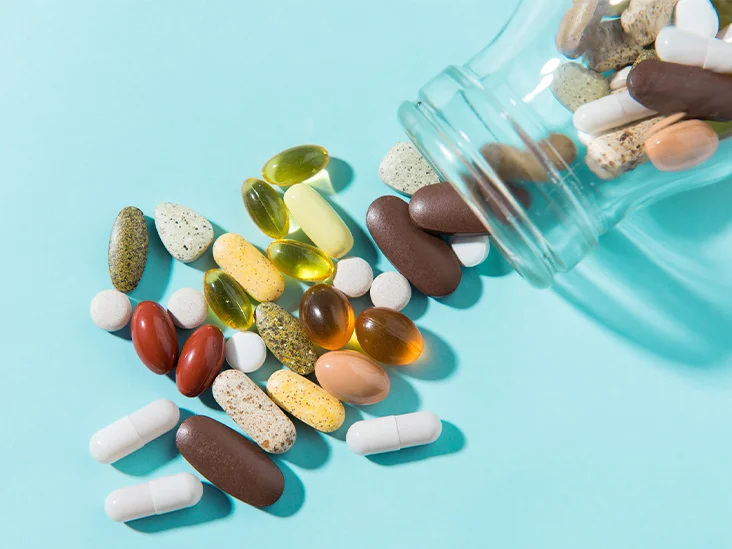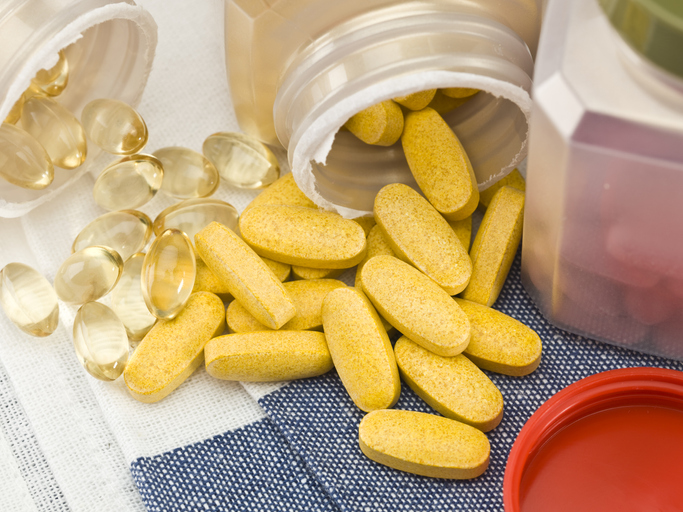Nutritional Supplements in ADHD management
March 16, 2024 - Reading time: 13 minutes

While pharmacotherapies, including psychostimulant medications, remain the cornerstone of evidence-based treatment, concerns over side effects and long-term efficacy have led families to explore alternative treatments, including nutritional supplements.
The Role of Nutritional Supplements
In recent years, there has been growing interest in natural supplements for ADHD management. In this article, we will explore the scientific evidence behind several popular natural supplements for ADHD and discuss their potential benefits, mechanisms of action, safety considerations, and recommended dosages.
Before diving into specific supplements, it is important to understand the context in which they are being considered. Methylphenidate (MPH) is a prescription medication commonly used to manage symptoms of ADHD. MPH increases the availability of dopamine and norepinephrine in the brain by blocking their reuptake, resulting in improved focus, attention, and executive function.
The majority of research on ADHD treatments focuses on pharmacological interventions like MPH. However, as mentioned earlier, many individuals with ADHD prefer natural approaches or seek to supplement their medication regimen.
Vitamin B12
Vitamin B12 is essential for maintaining healthy nerve cells and producing myelin, a fatty substance that coats and protects nerve fibers. A growing body of evidence suggests that vitamin B12 supplementation may benefit individuals with ADHD. For example, a study involving 70 children with ADHD found that those receiving intramuscular injections of vitamin B12 (hydroxocobalamin) exhibited significant improvements in attention and concentration compared to the control group.
Mechanisms of Action: Vitamin B12 plays essential roles in maintaining the integrity of nerve fibers. It is involved in the synthesis of myelin sheaths that protect neuronal connections, allowing for efficient transmission of neural signals.
Dosage Recommendation: The recommended daily intake of vitamin B12 is 2.4 mcg for adults and 4.0 mcg for pregnant women. Higher doses (up to 1 mg) have been studied for ADHD management.
Safety Considerations: Vitamin B12 supplements are generally considered safe with minimal side effects. However, individuals suffering from pernicious anemia or other vitamin B12 deficiencies should consult their healthcare professional before starting a supplement regimen.
Polyunsaturated or Omega-3 Fatty Acids (PUFAs)
PUFAs, particularly omega-3 fatty acids, have garnered attention for their potential benefits in ADHD management. Omega-3 fatty acids, specifically eicosapentaenoic acid (EPA) and docosahexaenoic acid (DHA), are essential fats that play crucial roles in brain function. Several studies suggest that omega-3s may help improve symptoms of ADHD. For instance, a randomized controlled trial involving 72 children with ADHD found that supplementing with fish oil (rich in EPA and DHA) led to significant improvements in attention, memory, and hyperactivity compared to placebo.
Mechanisms of Action: Omega-3s are crucial structural components of the brain, particularly in the development and maintenance of neural membranes. They also have anti-inflammatory properties, which may contribute to improved neuroplasticity and cognitive performance.
Dosage Recommendation: The American Heart Association recommends a daily intake of 250-500 mg combined EPA and DHA for maintaining heart health. For ADHD management, higher dosages (up to 3 g per day) have been suggested based on available research.
Safety Considerations: Omega-3 supplements are generally considered safe with minimal side effects such as fishy taste or burping. However, individuals taking blood thinners should consult their healthcare professional before starting an omega-3 supplement due to potential interactions affecting blood clotting.
Magnesium
Magnesium is a mineral that plays essential roles in nerve function and muscle relaxation. Several studies suggest that magnesium may help improve symptoms of ADHD, particularly hyperactivity and impulsivity. For instance, a randomized controlled trial involving 64 children with ADHD found that magnesium supplementation resulted in significant reductions in hyperactivity and impulsivity compared to placebo.
Mechanisms of Action: Magnesium is involved in various aspects of brain function, including maintaining proper neuronal excitability and regulating neurotransmitter release. It also has antioxidant properties, which may contribute to its potential protective effects on neural tissue.
Dosage Recommendation: The recommended daily intake of magnesium is 310-420 mg for adults and 80 mg for children aged 4-6. Higher dosages (up to 1 g per day) have been studied for ADHD management.
Safety Considerations: Magnesium supplements are generally considered safe, but they can cause diarrhea or loose stools in large doses. Individuals with kidney disease should consult their healthcare professional before taking magnesium supplements due to potential interactions affecting kidney function.
Iron
Iron is an essential mineral that plays crucial roles in brain development and function, particularly in the formation of myelin sheaths and maintaining healthy neural membranes. Several studies suggest that iron deficiency may contribute to symptoms of ADHD. For example, a study involving 25 children with ADHD found that those who were iron-deficient exhibited significantly worse symptoms of inattention compared to their iron-replete counterparts.
Mechanisms of Action: Iron is essential for the production and maintenance of myelin sheaths. It also plays crucial roles in synthesizing neurotransmitters, such as dopamine and serotonin.
Dosage Recommendation: The recommended daily intake of iron for adults is 8-18 mg, with a higher requirement (27 mg per day) during pregnancy. For children aged 4-8, the recommendation is 6.5 mg per day, and for those aged 9-13, it's 9.2 mg per day.
Safety Considerations: Iron supplements are generally considered safe with minimal side effects, but they can cause gastrointestinal symptoms such as nausea and vomiting when taken in large doses. Individuals taking blood thinners or those suffering from hemochromatosis (iron overload) should consult their healthcare professional before starting an iron supplement regimen due to potential interactions affecting kidney function and blood clotting.
Zinc
Zinc is a mineral that plays essential roles in brain development, particularly in the formation of myelin sheaths and maintaining proper neural excitability. Several studies suggest that zinc deficiency may contribute to symptoms of ADHD. For example, a study involving 100 children with ADHD found that those who were zinc-deficient exhibited significantly worse symptoms of inattention compared to their zinc-replete counterparts.
Mechanisms of Action: Zinc plays essential roles in brain development, particularly in the synthesis and maintenance of myelin sheaths. It is also involved in neurotransmitter release, allowing for efficient transmission of neural signals.
Dosage Recommendation: The recommended daily intake of zinc for adults is 10 mg, with a higher requirement (35 mg per day) during pregnancy. For children aged 4-8, the recommendation is 5.5 mg per day, and for those aged 9-13, it's 7 mg per day.
Safety Considerations: Zinc supplements are generally considered safe with minimal side effects. However, individuals suffering from hemochromatosis (iron overload) should consult their healthcare professional before starting a zinc supplement regimen due to potential interactions affecting kidney function and blood clotting.
Nutritional Supplements in ADHD Management
These recommendations highlight the potential benefits of omega-3 fatty acids, melatonin, iron, and zinc in managing ADHD symptoms.
Melatonin supplementation has shown efficacy in treating chronic insomnia in children with ADHD but has minimal effects on core ADHD symptoms. Given the common sleep problems in children with ADHD, melatonin can be a valuable adjunctive treatment for sleep-onset insomnia, improving sleep quality without the side effects typical of sleep medications.
This table aims to provide healthcare professionals with a concise reference to better understand how these supplements might fit into a comprehensive treatment plan for ADHD, particularly focusing on omega-3 fatty acids, melatonin, and the minerals iron and zinc. It's important to note the specific contexts in which these supplements have been found beneficial, as well as the limitations of current research findings. It is important to consult a physician before incorporating these supplements into a treatment plan, especially considering individual needs and possible interactions with other medications.
| Nutritional Supplement | Dosing Recommendations | Duration | Comments |
|---|---|---|---|
| Omega-3 Fatty Acids | 1-2 g/d (>400 mg EPA) | 12-16 weeks | Smaller treatment benefits compared to psychostimulants
|
| Melatonin | Effective for chronic insomnia in children with ADHD
|
- | Useful for treating sleep problems in ADHD
|
| Iron and Zinc | May reduce ADHD symptoms in children with or at high risk of deficiency
|
- | Data on efficacy in non-nutrient deficient populations is lacking
|

Clinicians should approach the use of nutritional supplements in ADHD with caution, emphasizing evidence-based treatments while considering supplements as adjunctive options in certain cases. It's imperative to assess for nutrient deficiencies before recommending supplementation and to monitor for potential side effects.
Acknowledgments
This article draws upon the research and findings of Dr. Michael H. Bloch, MD, MS, and Ms. Jilian Mulqueen, BA, as published in the Child and Adolescent Psychiatric Clinics of North America. Their work provides valuable insights into the potential role of nutritional supplements in treating ADHD, contributing to the ongoing discussion on holistic and integrative approaches to care.

